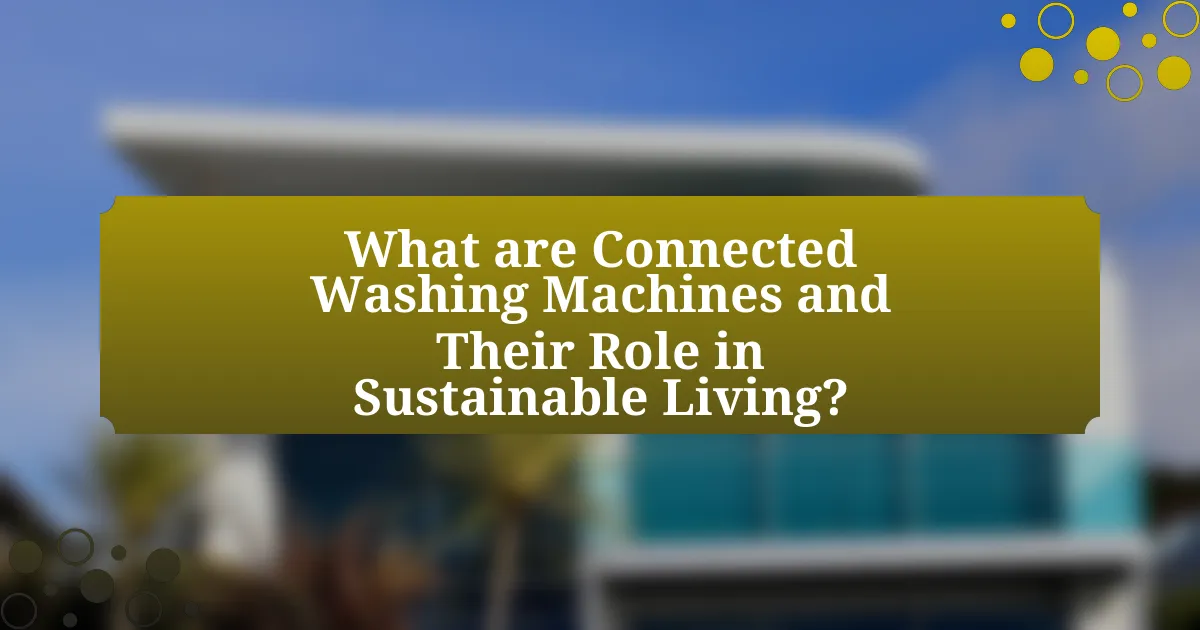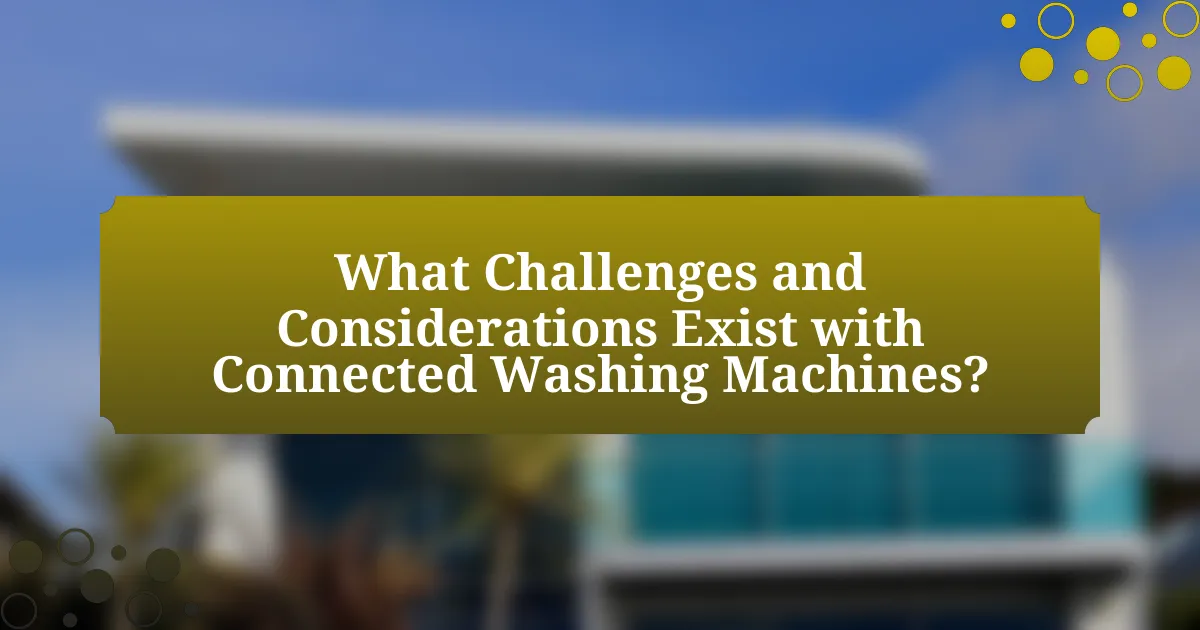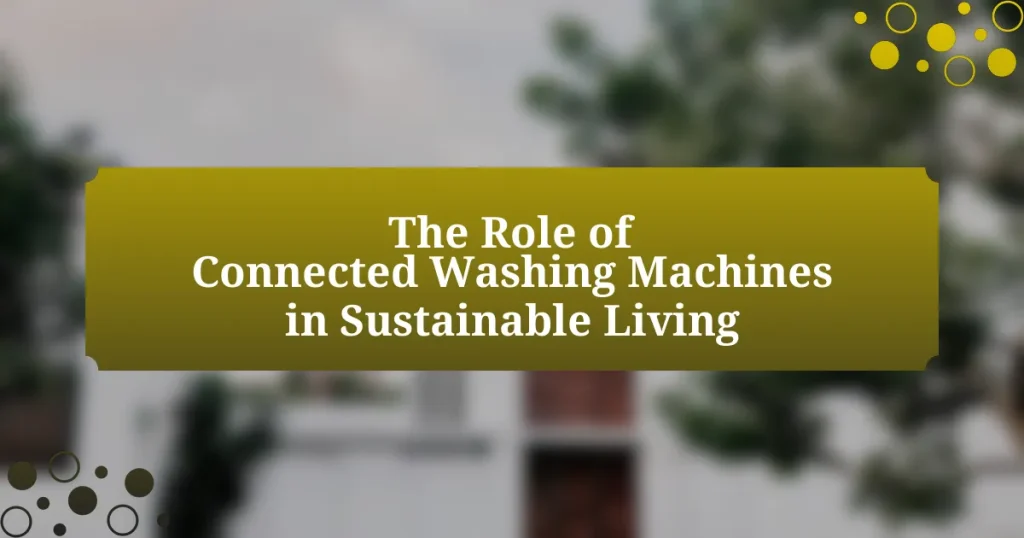Connected washing machines are smart appliances that leverage internet connectivity to enhance laundry efficiency and promote sustainable living. These machines optimize water and energy usage through advanced technologies, such as smart sensors and algorithms, which adjust wash settings based on load size and fabric type. By reducing energy consumption by up to 30% and water usage by a similar margin, connected washing machines contribute to lower carbon footprints and support environmentally friendly practices. The article explores their role in energy efficiency, user experience, and the environmental benefits they provide, while also addressing challenges related to privacy and maintenance.

What are Connected Washing Machines and Their Role in Sustainable Living?
Connected washing machines are smart appliances that utilize internet connectivity to enhance their functionality and efficiency. These machines can be controlled remotely via smartphone apps, allowing users to monitor and manage their laundry cycles, receive notifications, and access energy-saving features. Their role in sustainable living is significant, as they often incorporate advanced technologies that optimize water and energy usage, reducing overall consumption. For instance, connected washing machines can adjust wash settings based on load size and fabric type, leading to more efficient cycles. According to a study by the International Energy Agency, smart appliances can reduce household energy consumption by up to 30%, contributing to lower carbon footprints and promoting environmentally friendly practices.
How do connected washing machines contribute to energy efficiency?
Connected washing machines contribute to energy efficiency by optimizing wash cycles based on real-time data and user habits. These machines can adjust water levels, temperature, and cycle duration to match the load size and fabric type, reducing unnecessary energy consumption. For instance, a study by the International Energy Agency found that smart appliances can save up to 30% more energy compared to traditional models by utilizing features like remote monitoring and scheduling during off-peak energy hours. This intelligent management of resources not only lowers energy bills for consumers but also supports broader sustainability goals by decreasing overall energy demand.
What technologies enable energy-saving features in connected washing machines?
Connected washing machines utilize several technologies to enable energy-saving features, including smart sensors, variable speed motors, and advanced algorithms. Smart sensors detect load size and fabric type, adjusting water levels and cycle duration accordingly, which minimizes energy consumption. Variable speed motors optimize the washing process by adjusting the speed based on the load, reducing energy use during operation. Advanced algorithms analyze user habits and environmental conditions to recommend the most efficient washing settings, further enhancing energy savings. These technologies collectively contribute to a significant reduction in energy usage, aligning with sustainable living practices.
How do connected washing machines optimize water usage?
Connected washing machines optimize water usage by utilizing sensors and smart algorithms to assess load size and fabric type, adjusting water levels accordingly. These machines can analyze the weight of the laundry and determine the optimal amount of water needed for each cycle, reducing excess water consumption. For instance, studies indicate that smart washing machines can save up to 30% more water compared to traditional models by implementing these adaptive technologies.
What environmental benefits do connected washing machines provide?
Connected washing machines provide significant environmental benefits by optimizing water and energy usage. These appliances utilize smart technology to analyze load sizes and fabric types, allowing them to adjust cycles accordingly, which can lead to a reduction in water consumption by up to 30% and energy savings of around 20%. Additionally, connected washing machines can receive updates and maintenance alerts, ensuring they operate efficiently over time, further minimizing their environmental impact.
How do connected washing machines reduce carbon footprints?
Connected washing machines reduce carbon footprints by optimizing energy and water usage through smart technology. These machines can analyze load sizes and fabric types, adjusting wash cycles accordingly to minimize resource consumption. For instance, a study by the International Energy Agency found that smart appliances can lead to energy savings of up to 30% compared to traditional models. Additionally, connected washing machines can schedule operations during off-peak energy hours, further decreasing reliance on fossil fuels and lowering greenhouse gas emissions.
What impact do connected washing machines have on waste reduction?
Connected washing machines significantly reduce waste by optimizing water and energy usage. These appliances utilize smart technology to analyze load sizes and fabric types, allowing for precise washing cycles that minimize resource consumption. For instance, a study by the International Energy Agency found that smart appliances can reduce energy use by up to 30% compared to traditional models. Additionally, connected washing machines can provide users with real-time feedback and maintenance alerts, which prolong the lifespan of the machine and reduce the frequency of replacements, further contributing to waste reduction.

How do Connected Washing Machines Enhance User Experience?
Connected washing machines enhance user experience by providing convenience, efficiency, and personalized features. These appliances allow users to control and monitor their laundry remotely through smartphone applications, enabling them to start or pause cycles from anywhere. Additionally, they offer smart features such as cycle recommendations based on load size and fabric type, which optimize washing performance and reduce energy consumption. According to a study by the International Energy Agency, smart appliances can lead to a 10-30% reduction in energy use, contributing to both user savings and environmental sustainability.
What smart features do connected washing machines offer?
Connected washing machines offer features such as remote control, cycle customization, energy monitoring, and integration with smart home systems. These machines allow users to start or stop cycles from their smartphones, select specific wash programs based on fabric type, and monitor energy usage to promote efficiency. For instance, many models can connect to Wi-Fi, enabling users to receive notifications about cycle completion or maintenance needs, thus enhancing convenience and sustainability by optimizing water and energy consumption.
How does remote monitoring improve laundry management?
Remote monitoring improves laundry management by enabling real-time tracking of washing machine performance and usage. This technology allows users to receive notifications about cycle completion, maintenance needs, and energy consumption, which enhances operational efficiency. For instance, a study by the International Energy Agency found that connected appliances can reduce energy usage by up to 30% through optimized scheduling and monitoring. Additionally, remote monitoring helps in identifying issues before they escalate, thereby reducing downtime and maintenance costs.
What role do mobile apps play in enhancing user convenience?
Mobile apps significantly enhance user convenience by providing seamless control and monitoring of connected devices, such as washing machines. These applications allow users to operate their appliances remotely, schedule wash cycles, and receive notifications about the status of their laundry, which saves time and effort. For instance, a study by the International Journal of Interactive Mobile Technologies found that 85% of users reported increased satisfaction due to the ease of managing their appliances through mobile apps. This integration of technology into daily tasks exemplifies how mobile applications streamline household management, making it more efficient and user-friendly.
How do connected washing machines promote sustainable practices among users?
Connected washing machines promote sustainable practices among users by providing real-time data and insights that encourage efficient usage. These machines often feature smart technology that allows users to monitor energy and water consumption, leading to more informed decisions about laundry habits. For instance, studies show that users of connected appliances can reduce water usage by up to 30% through optimized wash cycles and scheduling during off-peak energy hours. Additionally, many connected washing machines offer reminders for maintenance and alerts for optimal load sizes, further enhancing resource efficiency.
What educational resources do manufacturers provide for sustainable usage?
Manufacturers provide various educational resources for sustainable usage, including user manuals, online tutorials, and sustainability guides. These resources often detail energy-efficient practices, optimal load sizes, and eco-friendly detergent recommendations, helping consumers reduce their environmental impact. For instance, many manufacturers offer digital platforms that include videos and interactive content to educate users on the most efficient settings for their connected washing machines, which can lead to significant water and energy savings. Additionally, some companies publish sustainability reports that outline their commitment to eco-friendly practices and provide tips for consumers to adopt similar habits in their daily routines.
How can users track their energy and water consumption with connected machines?
Users can track their energy and water consumption with connected machines through integrated smart technology that provides real-time data monitoring. These machines often feature built-in sensors and connectivity options, allowing users to access consumption metrics via mobile apps or web interfaces. For instance, connected washing machines can display energy usage statistics and water consumption levels, enabling users to make informed decisions about their laundry habits. This capability is supported by the growing trend of smart home devices, which, according to a report by Statista, is projected to reach over 75 billion connected devices globally by 2025, enhancing user engagement in energy and water conservation efforts.

What Challenges and Considerations Exist with Connected Washing Machines?
Connected washing machines face several challenges and considerations, primarily related to security, interoperability, and user privacy. Security risks arise from potential hacking, as these devices are connected to the internet, making them vulnerable to unauthorized access. Interoperability issues can occur when different brands or models do not communicate effectively, limiting the functionality of smart home systems. Additionally, user privacy concerns emerge from data collection practices, where manufacturers may gather personal information without clear consent. These challenges highlight the need for robust security measures, standardized protocols, and transparent data policies to ensure safe and effective use of connected washing machines in sustainable living.
What are the potential drawbacks of using connected washing machines?
Connected washing machines can pose several potential drawbacks, including privacy concerns, reliance on internet connectivity, and increased complexity in operation. Privacy issues arise as these devices often collect user data, which can be vulnerable to hacking or misuse. Additionally, if the internet connection is unstable or lost, the functionality of the washing machine may be compromised, limiting its usability. Furthermore, the integration of smart technology can lead to a steeper learning curve for users, making it more challenging to operate compared to traditional models.
How do privacy concerns affect user adoption of connected appliances?
Privacy concerns significantly hinder user adoption of connected appliances. Many potential users fear that their personal data may be collected, shared, or misused by manufacturers or third parties. A survey conducted by the Pew Research Center in 2021 revealed that 81% of Americans feel they have little to no control over the data collected about them, which directly impacts their willingness to embrace smart home technologies, including connected washing machines. This apprehension leads to a reluctance to invest in appliances that require internet connectivity and data sharing, ultimately stalling the growth of the connected appliance market.
What are the maintenance challenges associated with connected washing machines?
Connected washing machines face several maintenance challenges, primarily related to software updates, connectivity issues, and sensor malfunctions. Software updates are essential for optimal performance and security; however, they can sometimes lead to compatibility issues or require manual intervention, complicating maintenance. Connectivity issues, such as unstable Wi-Fi or network disruptions, can hinder remote monitoring and control, making it difficult for users to troubleshoot problems effectively. Additionally, sensor malfunctions can result in inaccurate readings, affecting wash cycles and potentially leading to inefficient water and energy use. These challenges highlight the need for regular maintenance checks and user awareness to ensure the longevity and efficiency of connected washing machines.
How can consumers make informed choices regarding connected washing machines?
Consumers can make informed choices regarding connected washing machines by researching energy efficiency ratings, understanding connectivity features, and evaluating brand reliability. Energy efficiency ratings, such as those provided by ENERGY STAR, indicate how much energy a washing machine consumes, helping consumers select models that reduce electricity usage and lower utility bills. Connectivity features, including smartphone apps and smart home integration, allow users to monitor and control their washing machines remotely, enhancing convenience and potentially optimizing wash cycles for better resource management. Additionally, examining brand reliability through consumer reviews and expert ratings can guide consumers toward manufacturers known for quality and customer support, ensuring a satisfactory purchase experience.
What factors should be considered when selecting a connected washing machine?
When selecting a connected washing machine, factors such as energy efficiency, compatibility with smart home systems, user interface, and available features should be considered. Energy efficiency is crucial as it impacts both environmental sustainability and utility costs; machines with high Energy Star ratings consume less electricity and water. Compatibility with smart home systems ensures seamless integration and control through mobile apps or voice assistants, enhancing user convenience. A user-friendly interface is important for ease of operation, while features like remote monitoring, cycle customization, and maintenance alerts can significantly improve the washing experience and promote sustainable practices by optimizing resource use.
How can users ensure they are maximizing the sustainability benefits of their machines?
Users can maximize the sustainability benefits of their machines by utilizing energy-efficient settings and optimizing load sizes. Energy-efficient settings reduce electricity consumption, while washing full loads minimizes water usage, both contributing to lower environmental impact. According to the U.S. Department of Energy, using cold water for washing can save up to 90% of the energy used for heating water, significantly enhancing sustainability. Additionally, regular maintenance of machines ensures they operate efficiently, further supporting sustainable practices.
What are some best practices for using connected washing machines sustainably?
To use connected washing machines sustainably, users should optimize wash cycles by selecting energy-efficient settings and running full loads. This practice reduces water and energy consumption, as washing machines consume significant resources; for instance, a standard washing machine uses about 40 gallons of water per load. Additionally, utilizing smart features, such as scheduling washes during off-peak energy hours, can further decrease energy costs and environmental impact. Regular maintenance, including cleaning filters and checking hoses, ensures efficient operation and prolongs the machine’s lifespan, contributing to sustainability.














